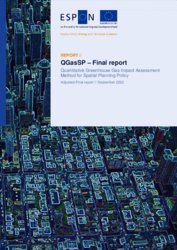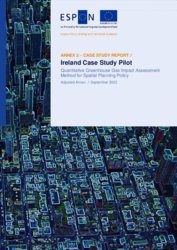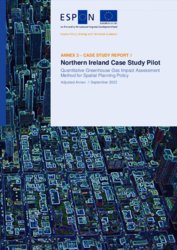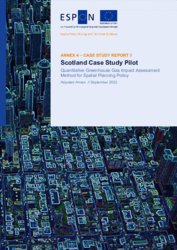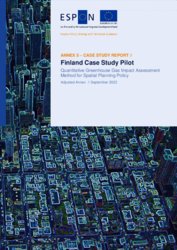QGasSP - Quantitative Greenhouse Gas Impact Assessment Method for Spatial Planning Policy
Theme: spatial planning, greenhouse gas, impact assessment, carbon reduction targets
Scope
European Union (EU) policymaking is reacting to climate change with increasing seriousness and urgency. In November 2019, the European Parliament declared a global climate emergency and called for a target of 55% greenhouse gas (GHG) emissions reductions by 2030 in order to reach its target on climate neutrality by 2050. The new European Commission (EC) has decided on a European Green Deal that will transform the Union into a modern, resource-efficient and competitive economy, where there are no net emissions of greenhouse gases by 2050. By the end of 2019, all EU Member State were required to submit their final National Energy and Climate Plans (NECPs) for achieving the current EU Climate and Energy Framework targets of a 40% reduction in GHG emissions by 2030 (from 1990 levels).
The main objective of this service is to produce a robust, simple and proportionate methodology that will allow competent planning authorities at national, regional and local administrative levels to quantify and forecast the influence of spatial planning policies on GHG emissions in a consistent manner. The methodology will be transformed into a flexible and user-centric web application. During the development, the knowledge demands and technical requirements of the four stakeholders included within this Targeted Analysis Project will be addressed and the web application will be tested through pilot application in each of the stakeholder case study territories.
Policy questions
- How can consistent and comparable GHG baseline emissions data be collected at national, regional and local levels to assess the urban and land-use share of GHG emissions relevant for spatial planning policy and practice?
- How can the efficacy of spatial plans and possible alternatives be systematically modelled, via standardised quantitative methodologies and accounting protocols, to determine their overall impact on GHG emissions, and aid cross-country, inter-regional and inter-municipality comparisons?
- How can a better scientific understanding be developed of how national, regional and local planning authorities can prioritise relevant GHG mitigation strategies, including through enhancing the effectiveness of the SEA process, to rapidly build political will for climate action?
Main Outcomes
- A flexible, user-centric web application which is simple to use in modelling GHG emissions from differing spatial planning policy options and in informing decision-making processes, including SEA. The model is expected to:
- include GHG accounting parameters for consistency and comparability in quantifying urban and land-use based GHG emissions relevant to spatial planning policy.
- apply for pan-European application and has the potential to play a useful role in informing spatial policy decision-making, improving the SEA process and assist in building political will for effective long-term climate action.
- be tested through pilot application in each of the stakeholder case study territories included in this Targeted Analysis Project.
- A comprehensive and associated practical user guide and recommendations to ensure that the value of the tool in the spatial planning policy assessment process is maximised, including how it can be integrated into the SEA process.
Stakeholders
- Eastern and Midlands Regional Assembly, IE (lead stakeholder)
- Scottish Government – Planning & Architecture Division, UK
- Department of Infrastructure, Northern Ireland, UK
- Regional Council of Kymenlaakso, FI
Contractors
- Tallinn University of Technology, EE (lead contractor)
- Stockholm Environment Institute Tallinn Centre, EE (joint partner)
- IWA, subsidiary of the Oivan Group Oy as from 1st of July 2020, FI (joint partner)
- City of Dublin Energy Management Agency, IE (joint partner)
Budget
€ 289.486,00
Lifetime
October 2020 – October 2021
Deliveries
- Inception delivery, 16 November 2020
- Interim delivery, 15 April 2021
- Final delivery, 15 October 2021
Contact
Marjan van Herwijnen (Senior Project Expert) marjan.vanherwijnen@espon.eu and Marta Roca (Financial Expert) marta.roca@espon.eu
